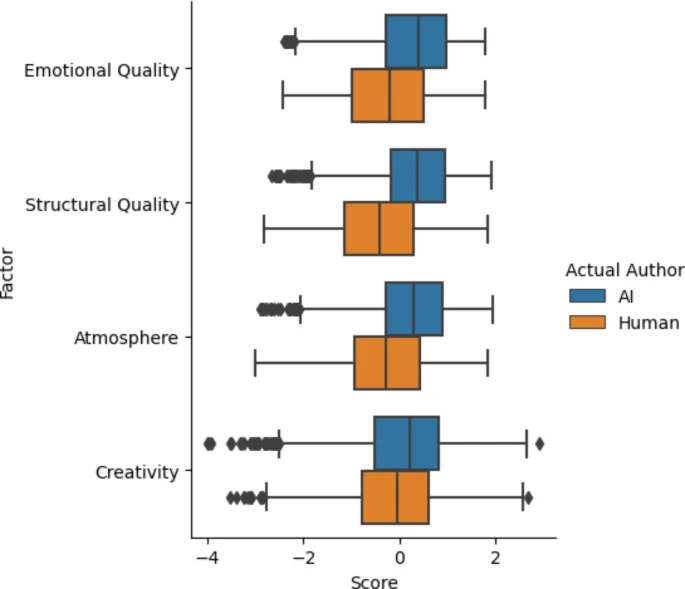Yet not all creatives are equal, some are instead like early 1980s bank tellers insisting their interactions with customers were what made them valuable and saying ATMS could never replace that. They didn't realize customers most often just want to get money and content is about content, not who makes it.
I have zero interest in who created art, I don't think comic books are worse off because a human doesn't do lettering by hand and colors and art are done on a computer.(1) Most AI art is garbage but even more human art is.
After hundreds of years of being a dominant literary form, people don't think as much of poetry now (2) and even people who like poetry may not care who writes it.(3) Which means LLMs are bad news for poets, because it's not only as good as human poetry, it's often better.
Two recent experiments using non-experts found that humans performed worse than a coin-flip, 46.6%, at predicting if what they read was written by a human or a machine. They also liked AI-generated work more.
This is a bit of a surprise. Pictures are one thing, cool art is cool art, and even music is easy to generate because we are in our seventh decade of the Pentatonic scale dominating pop(4) but poetry should be more challenging, because while it lacks defined rules for what is and is not acceptable, humans are more likely to 'know it when they see it', which also means when they don't.
The scholars used everything from Chaucer (at least until even more progressive schools ban him from their curricula) to Shakespeare to Sylvia Plath and contemporaries and the 1,634 participants recruited via Prolific were given 10 poems by a poet in random order. Except five of the 10 were written by AI in the "style" of that poet. Then they were asked to determined which was human.
The second experiment asked them to evaluate the quality. That part is the really bad news.

Until they are told it is AI. Like other creative endeavors, people have a greater swing in negativity when they find out it is AI, 75% even if they liked it before.(5)
That may need to be the approach. Decades ago, American unions demanded Country of Origin labels so they could tell consumers it was Made In America and therefore worth the higher cost and that may be a tactic for artistic endeavors also - a Made By A Human label.
NOTES:
(1) I know a whole lot of comic book history and it has all been wiped out numerous times and rebuilt by successive humans, an AI wouldn't have done that, that doesn't mean it's all bad, it mostly just means it's a waste of time to get invested in the stories and just enjoy them like popcorn. There have been a handful of great ones in the last 10 years. I can itemize them in a comic if that is interesting. What's intriguing is that the most successful Marvel films all used material from decades ago, before the company began wiping out the histories of its characters to generate sales by printing a "new #1 collectible edition."
(2) Sure, you can get published, but you will probably pay to do it. Even universities, which have basically been looking for new ways to spend money for the 35 years since they lobbied Democrats to make student loans unlimited "to increase opportunity" have a hard time justifying poetry. One example, Valpairaso Poetry Review, is shutting down after 25 years - it only had 1,000,000 hits on its website in all that time. That's 3,000 people a month despite publishing three Poet Laureates and even more Pulitzer Prize winners. No private sector effort would have bothered. That traffic is worth about $0.75. Institutional partners often carry them as outreach efforts but if an enthusiastic spearhead dies or burns out, the benefactor pulls support.
That's not to say they have no ongoing value. When Scienceblogs went out of business we acquired it specifically so it wouldn't disappear, but most of the content is and was unreadable to science fans or cultural moderates. It still dwarfed us in readership because its demographic was political and motivated to embrace confirmation bias about being evidence-based. Hosting a website costs little so I felt it important to keep it in existence.
(3) Not all niche markets are necessarily down, they have condensed to their revenue stream. There are numerous magazines about model and real trains, for example. Train aficionados will pay $50 a month for each subscription without complaint.
(4) Rap should be harder for AI to generate, except if AI can fool casual listeners about poetry, despite AI not knowing the cultural creative basis or contextual meaning in words, it can do so for rap as well.
(5) I am guilty of that. If I see something I like, and then deduce it is AI, I am probably more annoyed than I would be if I had known it was AI in advance. Most humans react this way.




Comments